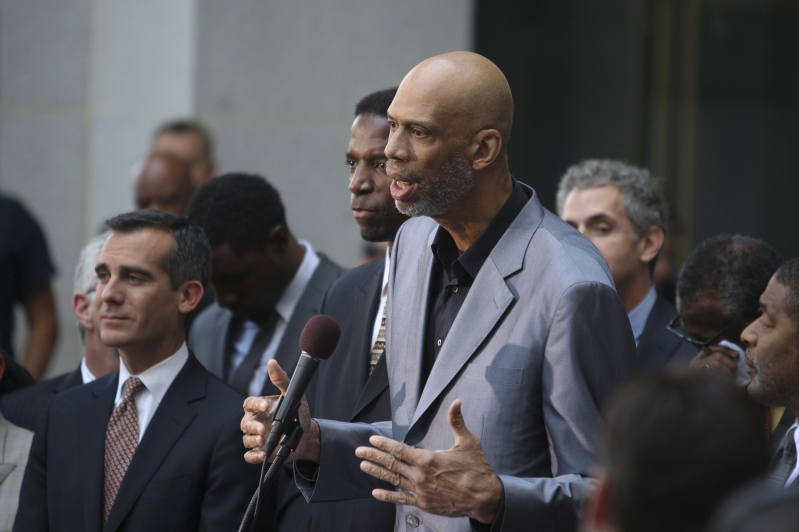
Born Ferdinand Lewis Alcindor Jr., basketball star Kareem Abdul-Jabbar changed his name upon converting to Islam, putting him at an interesting intersection of the issues majorly affecting the United States. As a self-made black American Muslim, among multiple racial clashes and divisive rants of certain presidential candidates, he's had plenty to say lately.
In October, the well-known celebrity said an enlightened America realizes that the founding fathers provided means to change the Constitution because they accepted they were people of their times. But he urged others to realize Muslims are often judged by the actions of a radical few. "No group wants that. When a Christian goes into a church and murders black people, we shouldn't condemn the religion. History is a long, long list of those who exploited religious faith to achieve their own power-hungry ends. When politicians whip up anti-Muslim sentiment, they are no better than the very terrorists they are condemning because they are using religious fervor to their own ends," he stated.
"Sorry to disappoint, but like most modern Muslims (and Christians and Jews), I strive to love my neighbor, help my community thrive, show compassion for the less fortunate, champion the rights of all marginalized people and avoid violence," stated the retired 68-year-old.
Abdul-Jabbar was interviewed last week by the director of the Mercatus Center at George Mason University in Virginia, Tyler Cowen. This professor of economics conducts one-on-one interviews as part of a series of talks.
The 7-foot-2-inch "NBA All-Star, author and activist" spoke with Cowen about social issues, sports and his love of jazz. Abdul-Jabbar's writing sometimes is published in Time Magazine, and he has appeared in a major motion picture.
Abdul-Jabbar's activism was carried Monday in The Washington Post, in which the Hall of Famer called upon Republican primary voters supporting Donald Trump to examine their reasons for voting for him. Speaking directly to Trump fans, he wrote, "Your candidate isn't who you think he is."
Religion is very important to American voters, he penned. According to a recent Pew Research Center poll, being an atheist is the trait most likely to cause voters to reject a candidate. "They are more likely to vote for you if you are Muslim than an atheist. Accordingly, Trump has asserted his deep religious belief and spoken several times of his respect for the Bible in an effort to win evangelical support." Then Abdul-Jabbar cited the several instances in which Trump was perceived to not rise to religious occasions, or to outright make mistakes.
He said voters supporting Trump are throwing away the chance to change the country for the better. "Even if Trump could win in November, bluster and insults are not enough when it comes to our economic, spiritual and social futures. Running a real estate company has nothing to do with running a country, forging alliances in Congress, or dealing with foreign allies and enemies."
"Of everything Trump has promised, what does the president actually have the power to change?" posed Abdul-Jabbar. "Can a president make it happen, and how would he or she do so? Because Trump would be powerless to do a lot of the things you want - make new laws, alter U.S. strategy - a vote for him is a guarantee that actual, realistic changes you want will never happen."
The spirit of the Quran, the Torah, the new Testament, or even the U.S. Constitution has guided Muslims, Jews, Christians, and Americans to allow their teachings to evolve with the times while staying true to the spirit, he said. "Life is short, but it's very wide."







